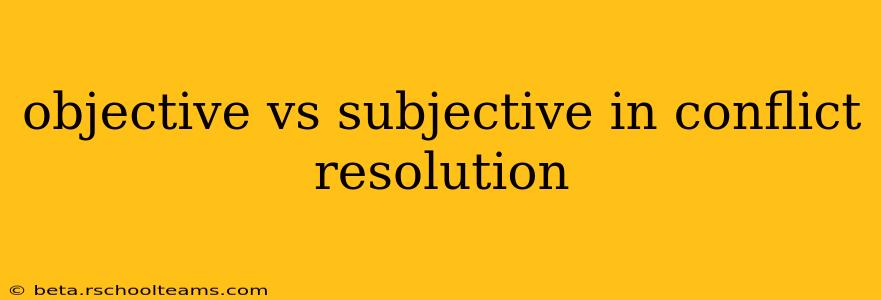Conflict is inevitable in any relationship, whether personal or professional. Successfully navigating these disagreements hinges on understanding the difference between objective and subjective perspectives and employing strategies that leverage both. This article explores the crucial distinction between objective and subjective viewpoints in conflict resolution, offering practical insights into how to effectively manage and resolve conflicts.
What is Objective Information in Conflict Resolution?
Objective information refers to factual, verifiable data that is independent of personal opinions or feelings. In a conflict, this might include things like:
- Dates and times: When did the incident occur?
- Specific actions: What exactly happened? Avoid generalizations like "you always..." or "you never...".
- Observable events: What were the visible consequences of the actions?
- Documented evidence: Emails, contracts, or witness statements.
Focusing on objective information helps to establish a shared understanding of the events leading to the conflict, minimizing misunderstandings fueled by subjective interpretations. It lays the groundwork for a more productive discussion.
What is Subjective Information in Conflict Resolution?
Subjective information, on the other hand, reflects personal opinions, feelings, interpretations, and beliefs. In a conflict, this includes:
- Emotions: Fear, anger, hurt, frustration.
- Perceptions: How each party views the situation and the other's actions.
- Values: Underlying beliefs and principles that influence a person's perspective.
- Assumptions: Unverified beliefs about the other person's intentions.
While subjective information might not be verifiable in the same way as objective data, it is crucial to acknowledge and understand it. Ignoring someone's feelings only fuels resentment and makes resolution less likely. The key is to address subjective experiences without letting them overshadow the objective facts.
How to Balance Objective and Subjective Information in Conflict Resolution?
The most effective conflict resolution strategies incorporate both objective and subjective information. Here's how:
1. Start with the Facts: Establish a Shared Reality
Begin by focusing on the objective aspects of the conflict. This creates a common ground from which to build understanding. Use neutral language and avoid accusatory statements. For example, instead of saying "You always interrupt me," try "I noticed that I was interrupted during three points of my presentation."
2. Acknowledge and Validate Feelings: Show Empathy
After establishing the objective facts, acknowledge the subjective experiences of each party involved. Listen actively to understand their feelings and perspectives without judgment. Even if you don't agree with their interpretation, validating their emotions shows empathy and builds trust. Phrases like, "I can see why you'd feel that way," or "That sounds really frustrating," can be very helpful.
3. Explore Underlying Needs and Interests: Move Beyond the Surface
Once emotions are acknowledged, delve deeper into the underlying needs and interests driving each party's position. What are their core concerns? What are they hoping to achieve? Understanding the "why" behind the conflict can often reveal mutually agreeable solutions.
4. Collaboratively Seek Solutions: Focus on Mutual Gains
With a shared understanding of the facts, emotions, and underlying needs, collaboratively brainstorm solutions that address everyone's interests. Avoid win-lose scenarios. Instead, aim for a win-win outcome where both parties feel heard, respected, and satisfied with the resolution.
How Can I Distinguish Between Objective and Subjective Statements?
Often, it's not easy to identify objective statements immediately. Ask yourself:
- Can this be verified independently? If yes, it's likely objective.
- Does this statement express a personal feeling, belief, or opinion? If yes, it's subjective.
- Is this statement based on observable facts or interpretations? Observable facts point toward objectivity.
What are some common mistakes in conflict resolution?
Common pitfalls include:
- Focusing solely on one party's perspective: Ignoring the other party's viewpoint and emotions can escalate the conflict.
- Attacking the person instead of the issue: Personal attacks prevent productive dialogue and deepen resentment.
- Making assumptions: Failing to verify information or understand the other party's motivations can lead to misinterpretations.
- Ignoring objective facts: Allowing emotions to completely overshadow the factual context prevents a fair and effective resolution.
By understanding and skillfully balancing objective and subjective information, you can significantly improve your ability to navigate conflicts constructively and achieve mutually beneficial resolutions. Remember, effective conflict resolution is not about "winning" but about building understanding, empathy, and ultimately, stronger relationships.
